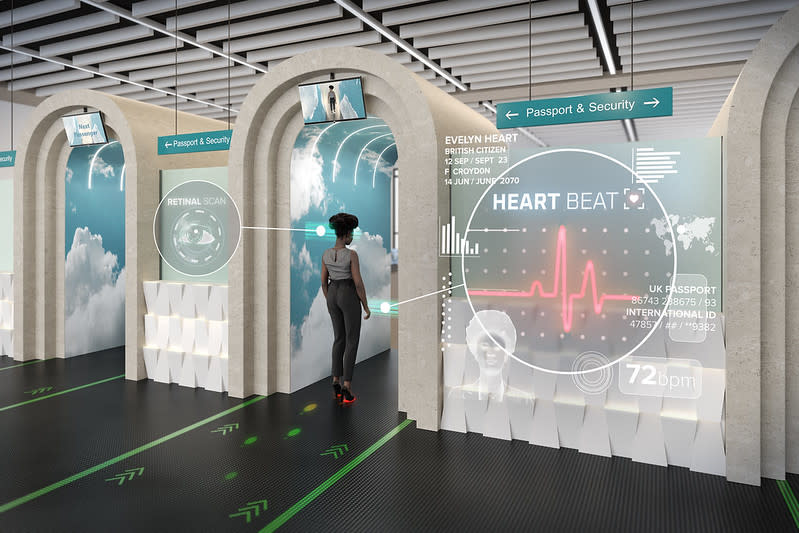Traditional passports 'may one day be swapped for heartbeats'

Traditional passports may soon be a thing of the past, with experts predicting that passengers will fly through security with heartbeat and biometric passports in the future.
As part of the easyJet 2070: The Future Travel Report, researchers have asserted that in just 50 years, passengers' heartbeat signatures - which are unique to every person - and biometric details will be logged on a global system in the same way fingerprint-scanning technology works today.
Other predictions include that biomimetic sensory plane seats which adapt to passengers' body shapes, optoelectronic inflight entertainment beamed directly to passengers' eyes, and digital personal holiday concierges will all be the norm by 2070.
The report was authored by a group of leading academics, including Professor Birgitte Andersen, Professor Graham Braithwaite, Dr Patrick Dixon, futurist Shivvy Jervis, and Dr Melissa Sterry.
Elsewhere, the researchers envisaged that eVTOL air taxis, which stands for electric vertical take-off and landing aircraft, will soon replace the airport car park shuttle. This will allow the journey to the airport to be quicker, with 85 per cent of passengers arriving by eVTOLs from their homes to the terminal.
It is also expected that there will be significant advances in the accommodation experience abroad, such as 3D-printed hotel buffet food which will allow holidaymakers to print whatever they want to eat at mealtimes while reducing food waste and a rise in energy-efficient subterranean hotels built into the earth.
Accommodation will become much more tailored to each individual, with hotel rooms transformed into smart rooms with beds already pre-made to exactly desired firmness, ambient temperatures, and music playing based upon preferences you select in advance of booking the holiday.
By 2070, it's thought that travellers will be able to go on "time-travelling experiences", where holidaymakers can holiday in the past while wearing haptic suits at historical sites that enable them to immerse themselves in live surroundings of the past - marvelling at wonders of the ancient world at the Colossus of Rhodes during a stroll in Rhodes Town or cheering among the crowds of the original Olympic Games in Ancient Greece.
Holidaymakers could even try out a destination before even buying a ticket.
Heading up the report, Professor Andersen of Birkbeck College said: "My job centres around innovation, and it's clear that through emerging technologies, the world of travel will look very different in the year 2070. The detailed analysis from the experts who have brought together this report are incredibly exciting and I can't wait to see what's in store for the future of travel in the coming decades."
While easyJet CEO Johan Lundgren added: "Innovation has always been in easyJet's DNA. We changed the way people travelled over 25 years ago and with our pioneering spirit we've been leading the way ever since. Whether that's through digital, engineering or operational innovations, we continue to innovate every day to help make travel more easy and affordable for our customers.
"The results of this report are incredibly exciting, and I know we will see easyJet continue leading the way to make many of these predictions become a reality for the holidaymakers of the future."
The top 15 travel predictions Brits would most like to see become a reality:
1. 'Time-travelling' holiday experiences via haptic suits that allow you to visit historical sites but see how life would have played out many years ago (i.e. seeing the Colossus of Rhodes in 280BC)
2. Hassle-free airport security - using biometric heartbeat passports
3. Underwater 'sea-faris' taking tourists on aquatic adventures to the depths of the ocean
4. Subterranean hotels built into the fabric of the earth that are super energy efficient and at one with the environment
5. Smart hotels with personalised holiday rooms that adapt and configure to travellers' needs and wants on arrival
6. Local language hearing aids will be available to take with us on holiday allowing us to speak the local lingo
7. 'Try before you buy' bionic and Metaverse holiday previews will provide holidaymakers with a virtual experience allowing them to see, hear, smell and feel a destination before booking
8. Ergonomic and biomimetic sensory plane seats that adapt to passengers' body shape, weight and temperature, providing ultimate comfort
9. 3D-printed hotel buffet food serving up any all-inclusive breakfast, lunch and dinner that holidaymakers desire - and reducing food waste
10. Inflight entertainment beamed directly in front of passengers' eyes, doing away with the need to download shows before you fly or the need for onboard TV screens
11. Week-long holiday package trips to the moon
12. e-VTOL air taxis taking passengers from home to the airport terminal, as well as ferrying holidaymakers around city locations abroad
13. Autonomous rent-a-car services on location - driverless hire vehicles that ferry travellers around their holiday destination
14. Digital holographic personal concierge - accompanying holidaymakers to provide up-to-date destination information and advice
15. 3D-printed recyclable holiday clothes available on arrival at your hotel, doing away with suitcases.


